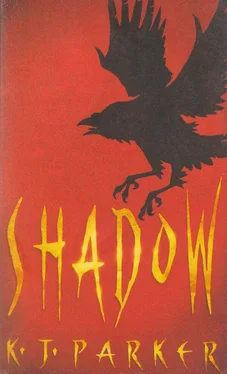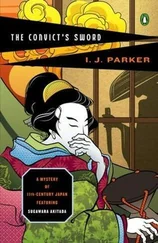K Parker - Shadow
Здесь есть возможность читать онлайн «K Parker - Shadow» весь текст электронной книги совершенно бесплатно (целиком полную версию без сокращений). В некоторых случаях можно слушать аудио, скачать через торрент в формате fb2 и присутствует краткое содержание. Жанр: Фэнтези, на английском языке. Описание произведения, (предисловие) а так же отзывы посетителей доступны на портале библиотеки ЛибКат.
- Название:Shadow
- Автор:
- Жанр:
- Год:неизвестен
- ISBN:нет данных
- Рейтинг книги:3 / 5. Голосов: 1
-
Избранное:Добавить в избранное
- Отзывы:
-
Ваша оценка:
- 60
- 1
- 2
- 3
- 4
- 5
Shadow: краткое содержание, описание и аннотация
Предлагаем к чтению аннотацию, описание, краткое содержание или предисловие (зависит от того, что написал сам автор книги «Shadow»). Если вы не нашли необходимую информацию о книге — напишите в комментариях, мы постараемся отыскать её.
Shadow — читать онлайн бесплатно полную книгу (весь текст) целиком
Ниже представлен текст книги, разбитый по страницам. Система сохранения места последней прочитанной страницы, позволяет с удобством читать онлайн бесплатно книгу «Shadow», без необходимости каждый раз заново искать на чём Вы остановились. Поставьте закладку, и сможете в любой момент перейти на страницу, на которой закончили чтение.
Интервал:
Закладка:
'Oh,' Copis said.
She didn't say anything else for a long time. Instead the cart rumbled sedately down what used to be the main street, now a pattern in the grass, and if from time to time something brittle crunched under the heavy wheels, it could just as easily have been something innocuous, like a potsherd.
'All right,' Copis said, 'we'll just have to press on to Josequin, assuming it's still there, of course. We'll have to work some of the poxy little villages south of the city. They're a miserable lot, but better than nothing.'
He'd been looking around, taking note, like an observer from a neutral country. 'Who do you think did this?' he asked. 'The pirates?'
She shrugged. 'That's the likeliest bet,' she replied. 'But it could have been somebody's army, making an example. Or one of the free companies, of course. I'm not sure it matters terribly much any more.'
She stopped the cart in front of the biggest remaining structure, which still had about a third of its roof intact. 'We might as well stay here tonight,' she said, yawning. 'Accommodation's probably not up to much, but at least it won't cost us anything. Got to look on the bright side,' she added.
'What do you think this place used to be?' he asked as he unyoked the horses.
'No idea,' she replied. 'Either the temple or the foundry, nothing else would have rooms this size. You can go and explore if you want to. I'm going to get some sleep. I find the end of the world makes me feel tired like a dog. Oh, and you can forget about anything to eat. That bread and cheese we picked up from your cavalry friends is going to have to see us to Josequin, unless you fancy spit-roasted horse and a long walk.'
While there was still a smudge of light to see by, he picked his way through the building, stepping gingerly over fallen roof beams and rafters, taking care to avoid the places where the floorboards had started to rot. The temple, he guessed, rather than the foundry, since the rooms were all empty, and foundry gear would be too heavy to carry away as plunder, unless that had been what they'd come for in the first place. Besides, he thought, where else would the god Poldarn spend the night but in a temple?
As he was feeling his way back in the dark he stubbed his toe on something and looked down to see what it was. It turned out to be a fat yellowish blob, about the size of a child's head, cold to the touch, smooth and metallic, and heavier than it looked when he tried to lift it. The part of the building he was in had been gutted by fire, leaving nothing but a few rafters. I think I know what this is, he thought. Could come in handy, at that. He thought for a moment, then went outside through a gap in the wall and followed the side of the building round to where they'd left the cart. There was a nice space in the back, under a couple of mouldy old blankets, just the right size, and not the sort of place where anybody would think to look in the usual run of things. As a final test, he found Copis' small knife and scratched the surface of the lump; it caught the moonlight and flashed, like a distant helmet. That was the good stuff, all right.
Not that he didn't trust her, of course, but there was no immediate need to tell her right now, and it'd make a pleasant surprise for her once they reached somewhere comfortable and safe where he could dispose of it. The contents of somebody's strongbox, he guessed, melted down and fused by the heat, losing the memory of its original shape but not its intrinsic virtues-nice upbeat comparison, he told himself. Things could be getting better.
Chapter Four
Burn the village, he says. In this rain? Who's he kidding? (I'm asleep, he reminded himself. This is a very realistic dream, so I must remember; I'm asleep, it's isn't really…)
You, quit complaining. Make yourself useful, go and see if you can find some lamp oil or something. Lamp oil and straw. Well, don't just stand there.
(He remembered the argument, between the body in the water and its reflection. He knew that the body in the water wouldn't let him keep this dream-put it back, it's dirty, you don't know where it's come from. That was a great pity.)
It's all very well him saying lamp oil, but there isn't any. Tallow, yes. Candles. No oil lamps. And the straw's all wringing wet, look. You'll never get that to burn in a thousand years.
(He could try and keep hold of it, he supposed, but he didn't know how, and anyway, the body in the water would find it wherever he hid it and take it away from him. If only he could keep just a bit of it, a corner, something that would jog his memory-)
Cooking oil; that'll do. Light the thatch from inside, it'll burn better. Yes, all right, you're tired. So am I. But the sooner we start, the sooner we finish.
(Just a little bit of himself, as a souvenir; something to remember himself by. Was that really so much to ask? Did the body in the water always have to know best?)
You three-God almighty, why's it always you three? All right, let's see what you've got. Oh, bloody hell, didn't you hear what he said about no prisoners?
He could see the short man, the one who'd been shouting, but the others-he was one of them-had their backs to him, he couldn't see their faces. Two of them, the other two, were dragging a woman along with them. They'd got hold of her by the wrists, her arms stretched wide like guy-ropes, and as they hauled they lifted her off the ground so that her trailing feet left a line in the wet grass.
She isn't a prisoner, Scaptey, she's spoils of war. Perfectly legitimate. You heard the foreigner, he expressly said plunder's allowed.
The short man was giving them all a don't-try-my-patience look, as if they were children explaining why they should be allowed to keep a stray dog that had followed them home from the market. An interesting face, that man had, and clearly legible. His eyes said that he was too tired to be angry and almost too tired to care, but they couldn't keep the woman. He wished he could see their faces too. Apart from the one who was him, though, he hadn't a clue who they were.
He decided to move closer, leaving the problem behind, like a horse tethered to a rail. At least there were people he knew in the dream.
Oh, the hell with it-'Oh, the hell with it,' Scaptey, the short man, said. 'Do what you like, so long as you're done and ready to go by the time the rest of them get back. And make sure this place gets torched, right? The boss is in a bad enough mood as it is, and it'll be me that gets a boot up the arse if there's anything still standing.'
(Of course, he realised, I'm Scaptey. Not the man he was yelling at. I just didn't recognise myself, that's all. He looked again.)
'Wearily, Scaptey trudged across the courtyard and sat down on a barrel. For the last two hours he'd had to think of everything-their position, the enemy's position, possible traps and ambushes, the scary moment when it looked like they'd break through the far left of the line, the danger of pursuing too far and breaking order, the weather, the time of day-there'd be no point winning the battle if they took too long about it and missed their pickup, that'd be worse than losing… Then, when the enemy broke and ran and a man might be justified in thinking he'd done enough for one day, even more to think about and bear in mind: a village to plunder and burn, survivors to root out and deal with, followed by the aggravation of rounding up the rest of the party (just when they were starting to enjoy themselves), getting the plunder loaded on to the carts, sweeping up the stragglers, men who were too drunk or exhausted to move (and it didn't help having the boss's only son along for the ride; he couldn't very well bawl him out along with the rest of the bunch, but he couldn't let him run wild either, in case he got himself hurt or lost). Then he'd have just enough time to make a final check, every last damn thing, to make sure it'd all been done properly, before moving out and facing that long, gruelling march through the hills at double pace to get to the beach in time for the pick-up. All that to come… Right now he was still feeling groggy and sick after being bashed over the head with a big axe during the actual fighting. That reminded him. He unbuckled his helmet and examined it. Sure enough, there was a dent in the bowl just above the right temple, big enough to hide a walnut in. Some hit that'd been. If the fool had known to aim with the horn of the axe instead of the forte of the blade (like he was always telling his lads to do) he'd be dead now, or lying in the wet grass waiting to drown in air. As it was, he'd have to put up with this badly dented helmet until he could get it to an armourer and have the pit raised out, which could be days or even weeks. Needless to say, the inside of the dent was just nicely placed to press against the nerve and give him those splitting headaches that lasted all day…
Читать дальшеИнтервал:
Закладка:
Похожие книги на «Shadow»
Представляем Вашему вниманию похожие книги на «Shadow» списком для выбора. Мы отобрали схожую по названию и смыслу литературу в надежде предоставить читателям больше вариантов отыскать новые, интересные, ещё непрочитанные произведения.
Обсуждение, отзывы о книге «Shadow» и просто собственные мнения читателей. Оставьте ваши комментарии, напишите, что Вы думаете о произведении, его смысле или главных героях. Укажите что конкретно понравилось, а что нет, и почему Вы так считаете.












